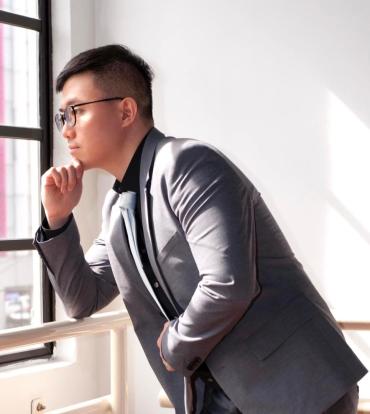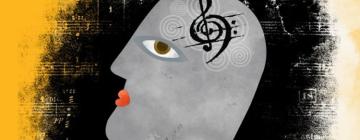
Born in Kuala Lumpur, Malaysia, Dr. Chuan-Li Ko graduated from Texas Tech University where he obtained his DMA in Piano Performance. He also holds the Associate, Licentiate and Fellowship (special candidate award) Diplomas in Piano Performance, awarded by the Trinity College of London. Through his eight years of graduate studies in the US, Dr. Ko has studied with many renowned pianists in the US such as William Westney, Daniel del Pino, Norman Krieger, Elizabeth Pridonolf, Donna Lee, Anton Niel, Asaf Zohar, and Marina Lomazov. He was also a recipient of scholarships and graduate teaching assistantships awarded by several institutions, in which he was appointed to teach Keyboard Skills, Music Theory, and Ear-Training class.
Dr. Ko has performed extensively as a soloist and vocal and instrumental collaborative pianist at various setting such as recitals and competitions. His most recent collaborations in the past couple of years include “Dream of Flowery Pursuit” his debut collaboration with Chinese instruments at DPAC Malaysia, “Around the World in 6 Hands and 88 Keys” at National Taichung Theater (Taiwan), “A Feast of Pianistic Wonders” where he shared the stage with another 3 pianists alongside the KLPAC orchestra, “Connecting the Dots” - a percussion-piano duo recital at DPAC (Malaysia), “Music of the Night” in which he was featured as a soloist presenting Mozart’s Piano Concerto No. 21, “Rach’d” - a joint recital featuring only Rachmaninov’s piano works and art songs at Esplanade Recital Studio (Singapore), “Mikado" with James Madison University Opera (United States), and Saint-Saëns's Organ Symphony with Malaysian Philharmonic Orchestra.
In spite of the global pandemic, Dr. Ko has been ardently involved in many projects and music competitions nationally and internationally. His recent achievements and contributions to the field include winning the Best Student Essay for 2021 Global Music Summit and emerging as the 1st runner-up of Charleston Music Festival 2020. Also, he virtually premiered Pump#5 for Percussion and Piano Duo at Music by Women Festival and Hot Air Music Festival respectively, written by Professor Dana Kaufman from University California at Riverside. In addition to that, Dr. Ko was also invited to present several topics in webinars, one of them being the ‘Emotional Expression in Classical Music’ hosted by Discussion et Rationalité. The presentation revolved around the importance of logicality in music performance. He discussed substantially how critical thinking and planning facilitate the process of emotional expression from the theoretical and performance perspectives, which is one of the aspects he highly values in piano teaching.
Dr. Ko is also a member of the Debonair Malaysia, a four-piano ensemble group, as well as Klaviercussion, a percussion-piano duo ensemble. He founded the duo group Klaviercussion with the aim of elevating public interest and appreciation for percussion-piano ensemble literature and modern music. Dr. Ko has a great passion for music teaching. He believes that music serves as a joy-seeking tool that will benefit students in a long run.
37.7202042, -122.4099154
San Francisco, CA (94134)
Full Name:
Chuan Li Ko
Contact Phone:
Contact Email:
Music Styles:
Classical
Teacher's Instrument/Voice:
Piano
Instrument/Voice Types Taught:
Piano
4 and above
Education:
Doctor of Musical Arts - Texas Tech University
Years Teaching:
17
Lesson Rate:
$120/hour for regular weekly lesson; $140 for ad-hoc lessons
Offers Private Lessons:
Yes
Teaching Method:
Throughout my 16 years of teaching individual piano lessons, keyboard skills, music theory, and ear-training classes, I have always challenged myself to incorporate creative methods into studio and classroom teaching. This innovation stimulates students’ interest in learning and accomplishing their goals. One time, I challenged a student to play a Chopin’s Nocturne more spontaneously by imagining himself as three different contestants playing the piece in a competition. Not only did I request him to make each rendition different and better from the previous, I also compelled him into imagining that “the piece has never been written but it is something that he is improvising as it goes along.” The result was magical as he pushed himself beyond his capabilities. My philosophy of education centers on maximizing students’ potential and strengths. I seek to provide the best possible environment and tools to enhance students’ learning experiences.
“Teach a man to fish and you feed him for a lifetime” has always been my motto. The two main aspects I focus on intensively in self-directed learning are the mindset and strategy developed and employed while working on a piece of music. Though our role as educators is to provide guidance to students of all types, I believe that inspiring students to become independent musicians and lifelong learners can be more beneficial. In order to cultivate autodidacticism, I offer students guidelines and methods that serve as a learning compass outside of the classroom.
Although music interpretation is crucial in a performance, the preparatory work in the practice room determines the final product. Evidently, slow practice has been the practice strategy for many musicians in the pursuit of technical improvement. I very much prefer the idea of practicing a passage rhythmic-less-ly, as it relieves body tension taking place under the restraint of rhythmic complexity. Another modification I take with slow practice is dismantling the passage into small units; taking them out of dynamic, expressive, and rhythmic context; and playing the notes deep into the key bed with full physical engagement. At times, it is necessary to play the passage fast to test-run the fingers in order to understand how different parts and levers of our body work together as a whole.
The body is able to take in much more information during the process of music construction than musicians previously thought. Teaching our body how it feels while executing every single note on the piano and slowly but mindfully digesting the information, will consolidate the learning. While it is good to be goal-oriented in the practice room, it helps to allow our body and mind to experiment and embrace fully our experience with music. I teach my students not to fear or resist technical difficulties, but take time to understand why and how our mind and body react to the music in such a way. Building this mindset for piano practice can lead to a much more engaging, fun, and rewarding learning process.
Similarly in teaching, I prefer to take things slow. Besides setting goals periodically to motivate my students, each week I am able to find new angles and aspects in an old piece to work on. Because I care about what each student can offer differently in their playing, I always provide feedback that brings out their best. I am also open to discussion with students in which they bring in unique, dynamic, and unconventional ideas. As a result, I discover something new from my students daily.
I like to make new concepts fun and easy to absorb. While I constantly assign tasks and pose questions that challenge my students to think critically, I am good at presenting my ideas in a relatable yet profound way.
Teaching is not only about imparting knowledge and skills from a teacher to a learner. As an educator, it is my responsibility to figure out how each student learns and to provide students opportunities to explore, discover, and identify their strengths and weaknesses. Instruction should be adjusted accordingly and tailored to the needs of each student, with the intent to maximize their creative ideas and innovative thinking. By challenging them to cope with difficult and unfamiliar tasks at a higher proficiency level, I contribute to their exploratory process as they discover and develop their own capabilities. Ultimately, I seek to encourage students to continue learning in a life-long passion for music.
Makes House Calls:
Yes
